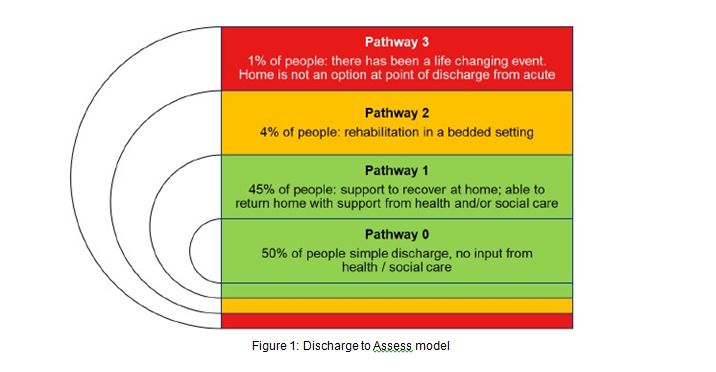Home First will get you home from hospital!
Home First is the approach used to support people to return home from hospital when they need an assessment for care, support, rehab or recovery. We call it the Home First Pathway, (or sometimes called Pathway 1), and it should be the default pathway for most people leaving hospital. Most people can leave the hospital without needing any support, but some people will have some ongoing needs; a very small number of these people are not able to return home directly from hospital, but for most people the Home First approach should be considered as the first and best option where possible.
The Home First Pathway comes under the Discharge to Assess Model (DTA). The DTA model aims to enable people to leave hospital as soon as they are medically ready, rather than waiting for assessments in hospital. Instead, an assessment is completed outside of the hospital after they have been discharged. This is to prevent the negative outcomes that people experience from staying in hospital when they no longer need to be there, such as ‘deconditioning’ – losing strength, confidence and independence, hospital acquired infections, and poorer long term health and wellbeing outcomes.
Discharge to Assess is National Model which we are required to deliver:

The Home First Pathway is a multi-agency pathway delivered by Livewell (Plymouth and Devon), in partnership with Derriford Hospital, Local Authorities in Plymouth and Devon, and voluntary services such as the Red Cross. Staff in the hospital will talk to you about whether you require the Home First Pathway and if so, they will book this for you in preparation for when you are able to leave the hospital. You will then be met by a member of the Home First Team at home within 2 hours of your discharge. This could be a nurse, social care worker, Occupational Therapist or Physiotherapist – we call them a Home First Responder.
Your Home First Responder will complete an assessment with you in your own home and talk to you about any specific goals or outcomes you wish to achieve. They will then arrange care and support to help you; this could be rehab with a therapist, a short period of care to help you recover, or a short period of reablement to help you gain or regain strengths, skills and independence. This support will be delivered for a short period of time, often no more than a couple of weeks, and you will not need to pay towards the cost of it.
Sometimes people have long term care needs following this short period of support, and if this is the case an assessment will be completed to determine if you have eligible needs for care and support under the Care Act 2014. At this point you will also be subject to a financial assessment and will be required to contribute towards the cost of this care.

